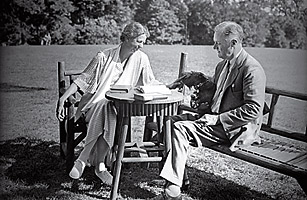
Eleanor and Franklin relax at home in Hyde Park, N.Y., in August 1933. She preferred her retreat at nearby Val-Kill.
(2 of 2)
Eleanor's humility worked because it was genuine. She did not think she was particularly special. In fact, she'd spent the first half of her life feeling inadequate. Her beautiful mother was openly disappointed in Eleanor's looks; she died when Eleanor was 8. Her father's alcoholism prompted his relatives to put him in an insane asylum, and he died when Eleanor was 9.
In boarding school in England, Eleanor began to find her voice. There she was valued for her ideas and her passion. Soon after she returned to New York City, she began dating Franklin, her fifth cousin once removed. "He was young and gay and good-looking," she said later, "and I was shy and awkward and thrilled when he asked me to dance." In Eleanor, Franklin found someone unlike the debutantes he knew: someone who taught children in the slums of the Lower East Side in her free time.
Once they were married, Eleanor spent more than a decade unconvincingly acting the part of society matron. She had six children but never felt confident as a mother. She didn't know how to play with them, having had little experience playing as a child herself. Her mother-in-law installed herself next door, calling herself the children's "real mother."
Everything changed in 1918 when Eleanor discovered that F.D.R. had been having an affair with Lucy Mercer, her social secretary. Eleanor was unpacking his suitcase when she discovered Mercer's love letters to him. "The bottom dropped out of my own particular world, and I faced myself, my surroundings, my world, honestly for the first time," she later wrote to a friend. The man who had asked her to dance had broken her heart, and their relationship would never be the same. She suggested they divorce, but Franklin knew that it would mean the end of his political career. Instead, he agreed to forever after maintain separate bedrooms and to stop seeing Mercer.
With the illusion of normality shattered, Eleanor was strangely free. She became active in the League of Women Voters and the social-justice causes she had cared about as a young woman — but had abandoned as a wife.
Three years later, Franklin lost the use of his legs. After the immediate crisis subsided, Eleanor found that she had an even bigger portfolio. Because it was difficult for him to travel, she started inspecting hospitals, mines and slums on his behalf. She began writing a newspaper column six days a week. To be sure, the Roosevelts paid a price for Eleanor's activism, careful as it was. She was under surveillance by her own government because of her friendships with young radicals. Her FBI file ran to almost 4,000 pages. She suffered significant policy failures too. She fought for universal health care, yet here we are. In 1940, when Germany was still allowing Jews to leave, she could not persuade Franklin to admit large numbers of refugees to the U.S. Her son Jimmy called this her "deepest regret."
After F.D.R. died in 1945, Eleanor stopped writing her nationally syndicated column — for four days. She packed her suitcases and left the White House. Eight months later, President Harry Truman asked her to be a delegate to the U.N.'s first session in London. She accepted — and immediately began to cram. "I knew that as the only woman, I'd better be better than anybody else. So I read every paper," she said later. "And they were very dull sometimes, because State Department papers can be very dull."
The delegates elected her to chair the committee drafting a Universal Declaration of Human Rights. She worked 18-hour days and traveled the world. She joined the board of the NAACP, and right-wing newspapers dropped her column because of her views on civil rights.
In 1962, Eleanor, 78, died of tuberculosis in her New York City apartment. She'd stopped writing her column just six weeks before. Her last dispatch contemplated the problems of poverty, education and housing. After more than three decades in public life, she still held out hope.